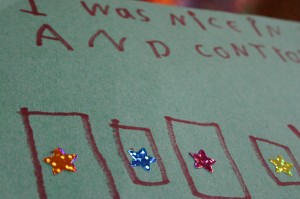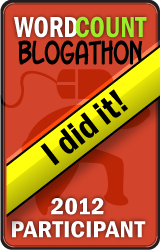 I’m thrilled to introduce Jenni Crain as my guest on IMP3RfeCt Mom. She’s another one of the accomplished writers in my online writer’s group. I think you’ll love her post.
I’m thrilled to introduce Jenni Crain as my guest on IMP3RfeCt Mom. She’s another one of the accomplished writers in my online writer’s group. I think you’ll love her post.
My daughter has a sticker chart on the fridge that says, in her seven-year-old mix of capital and lower-case letters, “I was nice in the morning and controlled my anger!” The exclamation mark is dotted with a star.
Then there are ten hand-drawn squares, with shiny stickers in several of them. If all goes well, she’ll pick out a Playmobil at the corner toy store downtown, as a reward, in less than a week.
This was all her idea. She saw a sticker chart of her brother’s and wanted a vehicle for scoring a new toy, too.
When I asked what she would do to earn a sticker, she didn’t hesitate. After countless talks and family meetings, she knows her early morning attitude problem is one of her biggest hurdles.
My heart goes out to her. She and I both struggle with a quick fuse. My tendency to “lose it” diminished following a blitz of therapy sessions a couple years ago. And it helped when my kids’ sense of reason emerged. The early years – when I couldn’t talk anyone out of anything – were tough on me.
Observing myself also helps. If I’m frustrated with how the morning’s going, I can take a breath and make an observation: “When we’re late and the kids are having a sit-in in the bathroom, refusing to brush their teeth, I feel like throwing this lunchbox against the wall.” That’s much better than actually doing it.
The problem is that I have done it (though with objects somewhat softer than a lunchbox). And it makes me cringe. Especially when I’m watching one of my kids stomp up the stairs or grit their teeth in a closed-mouth scream. They’ve learned this from me, I think.
I want to tell you I’ve reached a point of rational detachment. Or that I’ve committed myself to ten minutes of quiet prayer and meditation every morning and it’s made a world of difference.
But I haven’t been disciplined enough to cultivate either state of being. It’s going to take awhile. There are no substitutes for hard work and the drip of time. No magic tickets.
This week, an influential person in my life died. He was the minister at the church my husband and I attended when we went to college. Through the years, he was not only our pastor but a mentor and periodic lunch companion to us both. At the end of our undergraduate studies, he agreed to travel across the state to officiate at our wedding.
This man, as one friend put it, could “spin a great tale from that box.” And, boy, could he ever.
But he was not only a gifted speaker. He was as attentive to the theological questions of a twenty-something as he was to the weather and how it might affect his onion crop. He was the kind of Renaissance man formed from the rich, rural life he led; not only did his answering machine message include instructions on what to do if you wanted to buy a sheep, he also held office hours at our college, where he worked part-time as a French professor.
In a blog post, written by one of his daughters on the day of his death, I was surprised to read that he tended to have a quick temper. Reading this, I had two thoughts, in quick succession:
I can be a good, even an exceptional, human being and struggle with anger? Phew.
I can be an incredible influence on the lives of people, even a pinnacle in my community, and still be unable to stem the rage completely? Oh, boy.
No magic tickets. I’m in this one for the long haul.
But, as my therapist told me, minor adjustments in thought patterns – just this much – can go a long way. The thing is finding the right ones.
And I do have a bag of tricks now, tailored to my moments of annoyance, fury or frustration. I give myself concrete reminders, early and often. I’m gentle with myself if I have a bad moment with the kids. I wake up and remind myself: there’s no reason today can’t work out just fine.
These internal accommodations are more subtle than stickers and less sparkly, too. But they’re working, even if the give-and-take process of change is slow. And I hope in some way, my kids are picking up on the fact that I’m trying.
Jennifer Crain is a freelance writer and mother of two from Olympia, Washington. She loves to blow an entire morning at the farmers market with her kids. Find out more about her writing at www.jennifercrain.com.



Thanks for this lovely guest post. My daughter is 9 and needs anger management courses already. I joke, but she really does struggle with anger. It’s a new concept for me, and I’m trying to figure out how to parent it. I’ve found she needs to “walk away” and internally settle down, but I wish I knew other methods to teach her (you can’t always walk away). She’s a great kid, just has a short fuse. I appreciate your honesty.
Tia,
Thanks for reading and commenting!
Oh, boy. I know how tough it can be. We’ve had some success teaching our kids to walk away when they feel angry. We also ask them to identify specific strategies for themselves. For awhile, my daughter would snuggle down in a corner of her room on a bean bag chair and read a book about feelings (she even stashed it there for awhile). Now, she goes to her room or a secluded area of the house and picks up any of her books. My son still uses his blanket (he’s four) – a few times I’ve found him under his covers, blanket in his mouth. Often, our kids will initiate their times away all on their own. It’s gratifying when they come back downstairs saying, “I’m all settled down!” Best wishes with your daughter – I know it can feel like a slow process.
Hmm. Tia, I posted another comment that didn’t show up here.
Thank you for reading and commenting. Oh, boy. I understand how difficult it can be to try and parent in the moments that are filled with anger for our kids. We’ve had some success in having our kids identify their own strategies – my son snuggles in his bed with his blanket, my daughter grabs a book. Sometimes it works better than others, but it sure is gratifying when they come down the stairs saying, “I’m all settled down now!”
Best wishes with your daughter – I know it can seem like a very slow process.
Love it, Jenni. Here’s what I struggle with. I want my kids to know anger is okay. Our society says it’s a valid feeling, but at the same time seems to also say expressing it is socially unacceptable (even hitting a pillow is bad, I’ve been told, because it’s hitting). So what tools do we give our kids besides deep breaths and teeth gritting? To me, most ways of handling anger seem to be a form of stuffing it. Maybe I need those therapy classes too. Hey, if you wrote an article on this, I’d read it!!
I agree, Joanna. Where is the line? A few times I’ve been on the phone with my mom, bemoaning my less-than-perfect responses toward my daughter. My mom responds with, “Well, she needs to know that her outlandish behavior will affect the people around her.” It reminds me that I’m not an automaton in front of my kids, nor do I want to be. I think as long as we keep the conversation lines open and respond as honestly as we can, our kids will learn and so will we. I also think internal motivation is key. If I raise my voice or get testy in response to unreasonable behavior, is that so inappropriate? But if I get pouty or outlandish myself, it smacks of a pity party or a simple lack of control, and that’s closer to the wrong side of the line for me.
Wow! How honest of you to write that, Jenni. I am prone to fits of anger, too, but wouldn’t be so brave as to write it out in a blog post. Thank you for sharing your real-life “not the finest moment” moments and suggesting ways that we can all improve.
Thank you for reading, Lisa, and for telling me a bit of your own experience. I’ve had this idea for a post kicking around for awhile but never felt comfortable sharing. But for some reason the timing feels right to share and seek more support. I knew I wasn’t the only one, it’s just such a taboo subject. I appreciate you reading and commenting today!
Jenni, this mama is crying at her desk (in a cubicle at work)! You and your writing are treasures. When I read that same comment by the pastor’s daughter on his blog, my heart swelled, too. He was an exceptional man. And he lost it now and again? And his daughter still loved him? WHEW. A weight went off my shoulders. This line about the lunch box is going into my own “anger toolbox”: When we’re late and the kids are having a sit-in in the bathroom, refusing to brush their teeth, I feel like throwing this lunchbox against the wall. Thanks, friend.
Lateness is a huge trigger for me! But, hey, we have kids so it’s going to happen now and again, right? Or maybe even every day.
Thanks for reading and so glad we’re in this together.
Jan, thank you for the chance to post here today. I feel so supported – thank you for commenting, everyone!
Hey, Jenni.
Thanks for the honesty. I’ve had issues with anger too, especially when dealing with young unreasonable children. My kids are older now and usually more reasonable than a typical 4 year-old but when they were little I really lost my temper with them way too often.
Having some tools like you suggested, repeating to myself what I am feeling when I feel like screaming at the top of my lungs at them, would have been very helpful. I regret yelling at them and most of the time I apologized after I had calmed down…but not to have yelled would have been better. (I am talking about “yelling my insides-out” kind of screaming. ARgh! I cringe to think of it.
Gosh, yes. The unreasonable years left me feeling miserable at the end of the day. Then I’d wake up dreading what I feared the day with my young kids would bring. It led to many losing-my-cool episodes that I’d rather forget. I feel the same way: the best option would be not yelling. As it stands, I’m finding it’s good to own up to it, find tools, be honest with our kids about our struggles and move through it.
I’m glad that you’re feeling less of that now that your kids are older. It’s definitely not always an easy road, this parenting thing. I really appreciate you reading and sharing.